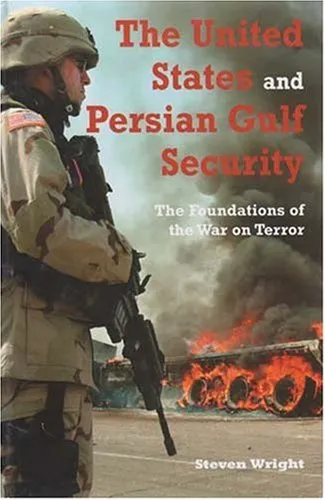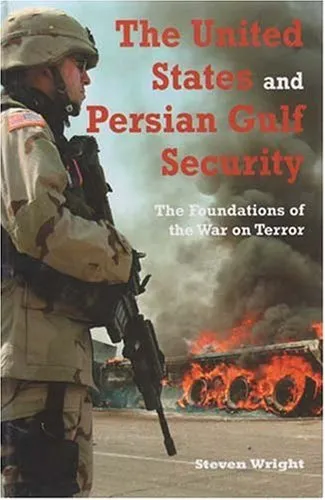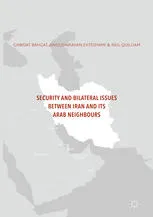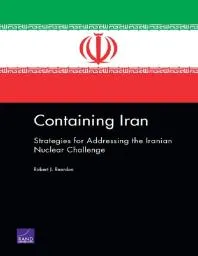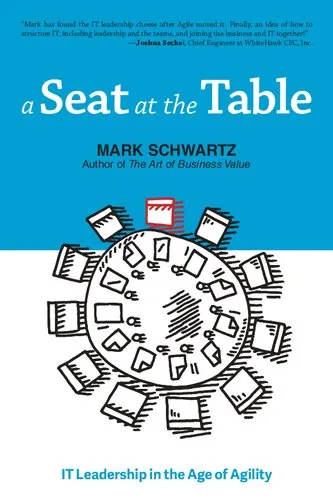The United States and Persian Gulf Security: The Foundations of the War on Terror (Durham Middle East Monographs)
4.0
Reviews from our users

You Can Ask your questions from this book's AI after Login
Each download or ask from book AI costs 2 points. To earn more free points, please visit the Points Guide Page and complete some valuable actions.Related Refrences:
Introduction to "The United States and Persian Gulf Security: The Foundations of the War on Terror (Durham Middle East Monographs)"
"The United States and Persian Gulf Security: The Foundations of the War on Terror" is a comprehensive examination of one of the most dynamic and geopolitically sensitive regions in the world: the Persian Gulf. Through meticulous research and in-depth analysis, this book explores the historical, political, economic, and strategic dimensions of U.S. involvement in this critical part of the Middle East. It delves into how the foundations of contemporary U.S. foreign policy and security concerns in the region were laid, eventually culminating in the War on Terror that defined global politics in the early 21st century.
This book is designed for scholars, policymakers, students of international relations, and anyone with an interest in understanding the intricate dynamics between global power and regional challenges. By examining historical trends and situating them within the post-Cold War context, it reveals how decades of policies, alliances, and conflicts contributed to the unprecedented security dilemmas faced in the Gulf today.
The content critically analyzes the evolution of U.S. strategies in the Persian Gulf and offers insights into the motives, interests, and consequences behind these policies. It contextualizes the War on Terror as a continuation of broader efforts that span decades, offering readers a deeper understanding of the geopolitical and ideological drivers of American foreign policy in the region.
Detailed Summary of the Book
The book begins by establishing the historic role of the Persian Gulf as a vital economic and strategic region, particularly due to its vast reserves of oil and natural gas. It explains how these resources have shaped not only regional political dynamics but also global geopolitical strategies. The United States’ interest in the Persian Gulf is traced back to the mid-20th century, during the Cold War period, when securing access to oil supplies became of paramount importance to Western economies and security frameworks.
As the narrative progresses, the book explores key events such as the Iranian Revolution of 1979, the Iran-Iraq War, the Gulf War of 1991, and the later strategic decisions following the September 11 attacks in 2001. Each chapter dissects how these milestones influenced U.S. policy direction, from its military engagements to the establishment of long-term alliances with Gulf states like Saudi Arabia, Kuwait, and the UAE. The book also highlights the intersecting roles of ideology, economic interests, and global security concerns in driving these policies.
A significant portion of the analysis is devoted to the War on Terror. By examining U.S. military interventions in Iraq and Afghanistan, as well as the impact of counterterrorism initiatives on regional stability, the book shows how the War on Terror is not an isolated phenomenon but the product of long-term trends that stem from the United States’ evolving priorities in the Persian Gulf.
Key Takeaways
- The Persian Gulf’s significance to global energy security has been a fundamental driver of U.S. involvement over several decades.
- The ideological clash between liberal democracy and authoritarianism in the Gulf has served as a backdrop for shaping U.S. foreign policy goals.
- The War on Terror represents a continuation of geostrategic priorities rooted in historical power struggles and economic interests.
- U.S. alliances with key Gulf states have been both a source of stability and a catalyst for regional tensions.
- Understanding the policies of the past is critical to addressing ongoing challenges in the Persian Gulf and mitigating future security risks.
Famous Quotes from the Book
"The Persian Gulf has long stood at the crossroads of global ambitions, serving as both a touchstone for cooperation and a powder keg of conflict."
"The War on Terror did not emerge in a vacuum; it is the result of decades of calculated policies and unforeseen consequences in one of the most strategically vital regions of the world."
"Energy security is not merely an economic issue; it is the lifeblood of modern geopolitics, driving nations to clash and converge in equal measure."
Why This Book Matters
In an increasingly interconnected global landscape, the Persian Gulf remains at the center of critical debates surrounding energy security, terrorism, and international stability. "The United States and Persian Gulf Security: The Foundations of the War on Terror" provides an unparalleled examination of the U.S.'s pivotal role in shaping the history, politics, and future of the region. This book matters not only because it offers a well-researched narrative of historical events but because it also sheds light on the ongoing challenges that continue to affect the global order.
For policymakers, the book serves as a valuable resource for understanding the intricacies of the region and crafting informed responses to its challenges. For scholars and students, it offers a foundation for further study and discussion on the consequences of global power intervention in regional affairs. For the general reader, it serves as an accessible yet profound insight into how decades of strategy, ambition, and conflict have shaped the contemporary Middle East and its relationship with the world.
By reflecting on the past while looking forward to the future, this book underscores the importance of historical context in addressing today's most pressing international issues.
Free Direct Download
You Can Download this book after Login
Accessing books through legal platforms and public libraries not only supports the rights of authors and publishers but also contributes to the sustainability of reading culture. Before downloading, please take a moment to consider these options.
Find this book on other platforms:
WorldCat helps you find books in libraries worldwide.
See ratings, reviews, and discussions on Goodreads.
Find and buy rare or used books on AbeBooks.
1374
بازدید4.0
امتیاز0
نظر98%
رضایتReviews:
4.0
Based on 0 users review
Questions & Answers
Ask questions about this book or help others by answering
No questions yet. Be the first to ask!
